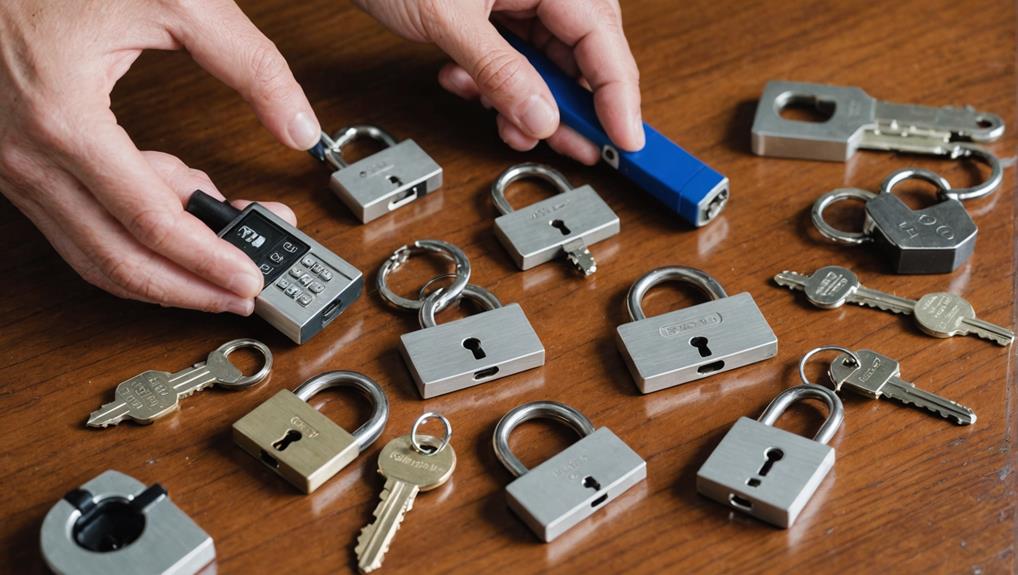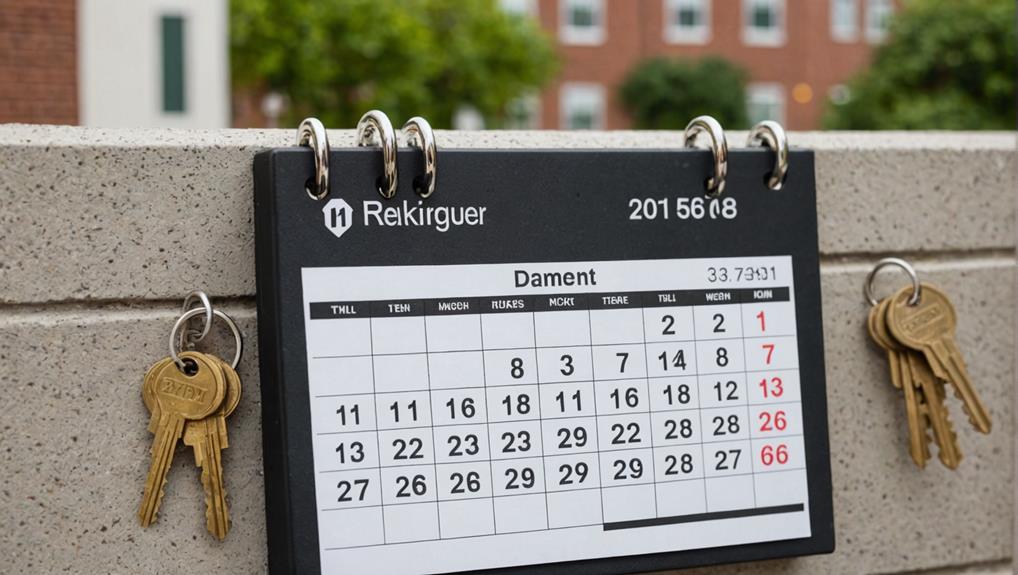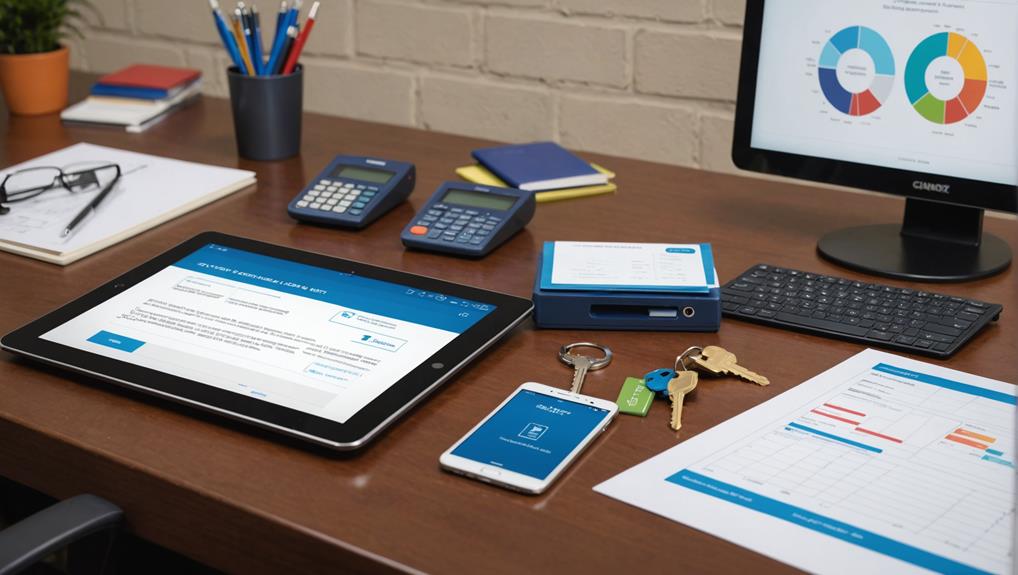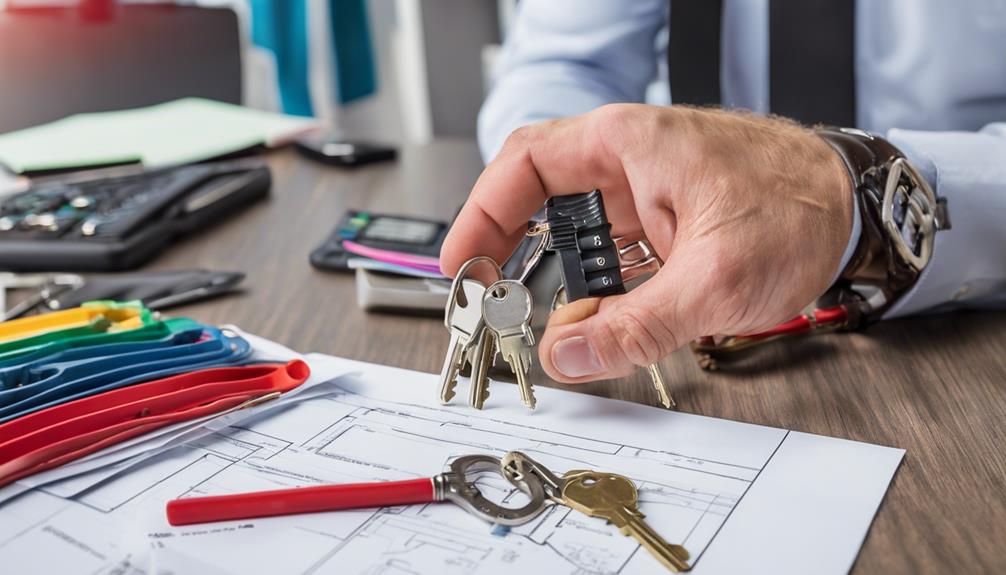Re-keying strategies are essential for property managers like you to guarantee security and build tenant trust. Start by evaluating the security needs of your properties through tenant feedback and incident reviews. Choose the right locks, balancing re-keying with potential replacements. Schedule regular rekeying every 6-12 months to stay proactive. Implement a master key system to streamline access and maintain control over keys with documented policies. Communicating effectively with tenants about these processes fosters a sense of community. To further enhance your strategies, there's plenty more to uncover about efficient re-keying practices that can benefit your management approach.
Key Takeaways
- Regularly assess security needs and tenant feedback to determine the frequency and necessity of re-keying across properties.
- Choose durable locks suitable for re-keying and balance between re-keying and lock replacement for optimal security.
- Establish a rekeying schedule, typically every 6-12 months, to enhance security and maintain tenant trust.
- Communicate re-keying processes clearly to tenants through emails, notices, and meetings to foster transparency and reassurance.
- Implement a master key system to streamline access for management while maintaining strict key control practices for security.
Assessing Security Needs
How secure is your property? As a property manager, you've got a responsibility to guarantee the safety of your tenants and their belongings. Start by evaluating security needs across all your properties.
Consider factors like location, previous security incidents, and tenant feedback. Engaging with your tenants can provide valuable insights into their concerns and experiences, helping you prioritize areas that need attention. Additionally, understanding the importance of re-keying in shared spaces can help you identify vulnerabilities in your security protocols.
Once you've reviewed the security landscape, it's time to look into efficient rekeying solutions. Property management rekeying isn't just about changing locks; it's about creating a secure environment for everyone involved.
Determine how often you should rekey based on tenant turnover and property type. Regularly scheduled rekeying can greatly enhance security and give tenants peace of mind.
Don't overlook the importance of staying proactive. By consistently evaluating security needs, you can implement timely solutions that not only protect your properties but also foster a sense of trust with your tenants.
This commitment to their safety will reflect positively on your property management reputation, making it easier to serve others effectively.
Choosing the Right Locks

When selecting locks for your properties, it's crucial to contemplate both security and functionality. As a property manager, your priority is ensuring the safety of your tenants while maintaining an efficient operation.
Start by evaluating the types of locks that best suit your needs. Deadbolts offer superior security, while smart locks provide convenience with keyless entry options. Additionally, consider the balance between re-keying vs. lock replacement as this can greatly impact your overall security strategy.
Consider implementing lock rekeying strategies that allow you to easily change keys without replacing the entire lock. This can be especially useful when rekeying multiple properties, as it saves time and money.
Look for locks that are compatible with rekeying kits, ensuring you can quickly adapt to tenant turnover or security concerns.
Don't forget about the importance of durability; choose locks made of high-quality materials that can withstand wear and tear.
Additionally, check for certifications from reputable organizations to guarantee that the locks meet industry standards.
Scheduling Regular Rekeying

Scheduling regular rekeying is essential for maintaining security in your properties. This practice not only protects against unauthorized access but also aligns with legal considerations in rentals regarding tenant turnover.
You'll want to choose an ideal schedule that balances safety with tenant convenience. Communicating effectively with tenants about this process guarantees everyone is on the same page and feels secure.
Importance of Regular Rekeying
Regularly rekeying your properties is essential for maintaining security and peace of mind. When you take the initiative to rekey, you're not just protecting the property; you're also ensuring the safety of your tenants. This proactive measure helps reduce the risks associated with unauthorized access, keeping everyone safe and secure.
Here's a quick look at the benefits of regular rekeying:
| Benefit | Description | Frequency |
|---|---|---|
| Enhanced Security | Reduces the risk of unauthorized access | Every 6-12 months |
| Improved Tenant Trust | Shows tenants you care about their safety | Annually |
| Maintenance of Locks | Keeps locks in good working condition | Every 12 months |
| Peace of Mind | Instills confidence in your management | Ongoing |
| Compliance | Meets industry standards and regulations | As required |
Choosing Optimal Rekeying Schedule
Determining how often to rekey your properties can greatly impact your overall security strategy. It's crucial to establish a rekeying schedule that meets the needs of both your properties and the tenants you serve. A good starting point is to rekey after every tenant move-out. This helps guarantee that no unauthorized individuals retain access to the property.
Additionally, consider scheduling annual rekeying for properties with longer-term tenants. This proactive approach enhances security and gives you peace of mind. If you find yourself frequently dealing with tenant turnover or security concerns, you might want to increase the frequency of rekeying.
You should also assess the unique circumstances of each property. For example, if you manage a multi-unit building, frequent rekeying can help mitigate risks associated with shared spaces.
Keep an eye on patterns of tenant turnover or any security incidents that may warrant more regular updates.
Ultimately, your goal is to create a safe environment for your tenants while protecting your investment. By tailoring your rekeying schedule to the specific needs of each property, you can guarantee a secure and welcoming experience for everyone involved.
Communicating With Tenants Effectively
Effective communication with tenants about rekeying schedules is key to maintaining trust and security. When you keep tenants informed, you demonstrate your commitment to their safety and well-being. Setting a regular rekeying schedule helps everyone understand the process and reduces any inconvenience.
Here's a simple table to illustrate an effective communication plan:
| Communication Method | Frequency | Purpose |
|---|---|---|
| Monthly | Inform about upcoming rekeys | |
| Notice posted | 1 week prior | Remind tenants of scheduled times |
| Personal call | As needed | Address any tenant concerns |
| Tenant meeting | Quarterly | Discuss security and rekeying plans |
Using these methods, you can guarantee tenants have all the necessary information. Encourage them to ask questions or voice concerns. This open line of communication fosters a positive relationship, showing that you truly care about their safety. Remember, a well-informed tenant is a satisfied tenant. By being proactive about rekeying schedules, you build a secure community where everyone feels valued and protected.
Maintaining a Master Key System

Maintaining a master key system can streamline access for you and your staff while enhancing security.
By utilizing the advantages of master keying, you can greatly reduce the number of keys needed, which simplifies management and increases efficiency.
You'll enjoy the convenience of fewer keys to manage, but it's essential to implement key control best practices to prevent unauthorized access.
Let's explore the benefits and strategies for effective master key management.
Benefits of Master Keying
When you manage multiple properties, a master key system can be a game changer. It simplifies your daily operations, allowing you to access various units without juggling numerous keys.
Imagine having the ability to swiftly respond to tenant needs, conduct maintenance, or address emergencies without the hassle of finding the right key. This efficiency not only saves you time but also enhances the level of service you provide to your residents.
Another significant benefit is improved security. With a master key system, you can control who's access to specific areas, ensuring only authorized personnel can enter certain spaces.
This added security can foster a sense of safety for your tenants, making them feel valued and secure in their homes.
Moreover, a master key system can reduce costs associated with lost keys and lock replacements. By minimizing the number of keys needed and streamlining access, you can focus your resources on other essential aspects of property management.
Ultimately, a master key system not only enhances operational efficiency but also elevates your ability to serve your community effectively.
Key Control Best Practices
A solid key control system is vital for property managers who rely on master key setups. To maintain efficiency and security, you should establish clear policies regarding key issuance, tracking, and return.
Start by creating a thorough inventory of all keys, noting which keys correspond to which units or areas. This helps you keep tabs on who's access to what.
Next, limit access to master keys. Only authorized personnel should have them, and consider implementing a sign-out system to track who took a key and when. Regularly review this list to guarantee that only current staff members have access.
You should also schedule routine audits to check your key inventory. This helps identify any missing keys and reinforces accountability among your team. If a key goes missing, re-keying the affected areas quickly is vital to maintaining security.
Lastly, educate your staff about the importance of key control. Encourage them to report any suspicious activity or lost keys immediately.
Documenting Key Management

Effective documentation of key management is essential for property managers to secure and accountability. By keeping accurate records, you can track who's access to various properties and when they were granted that access. This practice not only helps with security but also mitigates disputes, particularly concerning navigating disputes over re-keying costs between landlords and tenants.
Start by creating a centralized log for key distribution, noting each key's unique identifier, the person it's assigned to, and the date of issuance. This log not only fosters transparency but also helps you identify any potential security risks quickly.
Make it a habit to update the log whenever a key is returned or a new key is issued. Regular audits of your key inventory can further guarantee that everything is accounted for. If a key goes missing, you'll have a clear trail to follow, allowing you to respond promptly and effectively.
Additionally, consider implementing a digital system for tracking key management. Digital records can streamline the process and reduce the likelihood of human error.
Communicating With Tenants

Maintaining open lines of communication with tenants plays an essential role in property management. When you keep your tenants informed about re-keying schedules or security updates, it builds trust and fosters a sense of community.
It's crucial to let them know why re-keying is necessary, especially after a tenant moves out or if there are security concerns, as understanding the legal implications of re-keying locks can help tenants feel more secure in their living environment understanding legal implications.
You should also encourage tenants to voice their concerns or questions. Create a simple way for them to reach you—whether through email, text, or a dedicated tenant portal. Prompt responses can go a long way in alleviating any worries they may have.
Additionally, consider hosting occasional meetings or sending newsletters to keep everyone in the loop about property updates or safety tips. This proactive approach not only informs but also engages your tenants, making them feel valued.
Frequently Asked Questions
How Often Should I Rekey Properties After Tenant Turnover?
You should rekey properties after every tenant turnover to confirm security.
It's a smart practice that protects both you and future tenants. Even if a tenant returns keys, you can't assure they're all accounted for.
What Is the Cost Difference Between Rekeying and Replacing Locks?
When you consider the cost differences between rekeying and replacing locks, it's like weighing a quick fix against a more permanent solution.
Rekeying typically costs less, often just involving a simple adjustment to the existing lock.
Replacing locks, however, can be pricier due to the cost of new hardware and installation.
If you're looking to serve your tenants effectively while managing expenses, rekeying's usually the smarter choice!
Are There Specific Laws Regarding Tenant Access to Keys?
When it comes to tenant access to keys, laws can vary by location.
Generally, you're required to provide tenants with keys to their units and common areas. You should also make certain that any changes to locks or keys are communicated clearly and promptly.
It's important to check your local regulations to stay compliant, as some areas have specific guidelines about tenant rights and access.
Keeping your tenants informed helps build trust and respect.
Can I Rekey Locks Myself, or Should I Hire a Professional?
You might think rekeying locks yourself is as easy as pie, but it's more like baking a soufflé—tricky and high-stakes!
If you've got experience with locks, go for it; otherwise, hiring a professional's probably your best bet.
They've got the tools and skills to guarantee everything's secure. Plus, you'll save yourself the headache of mistakes and potential security issues.
Letting experts handle it can give you peace of mind!
What Are the Risks of Not Rekeying After a Tenant Moves Out?
Not rekeying after a tenant moves out can lead to several risks.
You might unknowingly give previous tenants access to your property, risking theft or damage.
Plus, future tenants may feel unsafe, knowing others could still enter.
It can also create liability issues if anything goes wrong.
By rekeying, you guarantee security and peace of mind for yourself and your new tenants.
It's a simple step that protects everyone involved.
Conclusion
In the world of property management, keeping your spaces secure is like nurturing a garden; it requires attention and care. By implementing these re-keying strategies, you're not just protecting your properties—you're fostering peace of mind for yourself and your tenants. Embrace the little changes, communicate openly, and watch your security flourish. Remember, a well-kept key system is the heart of your property's safety, ensuring everyone feels right at home while you keep a watchful eye.









